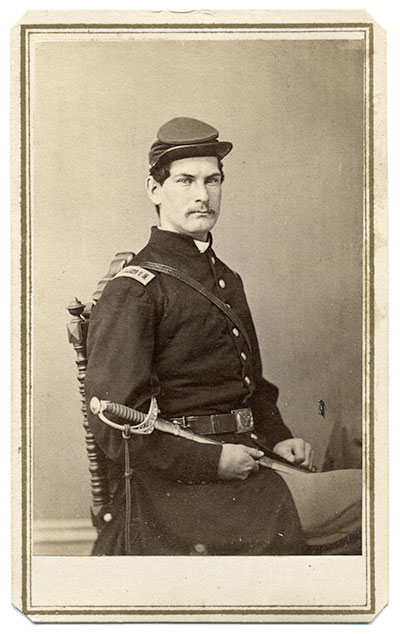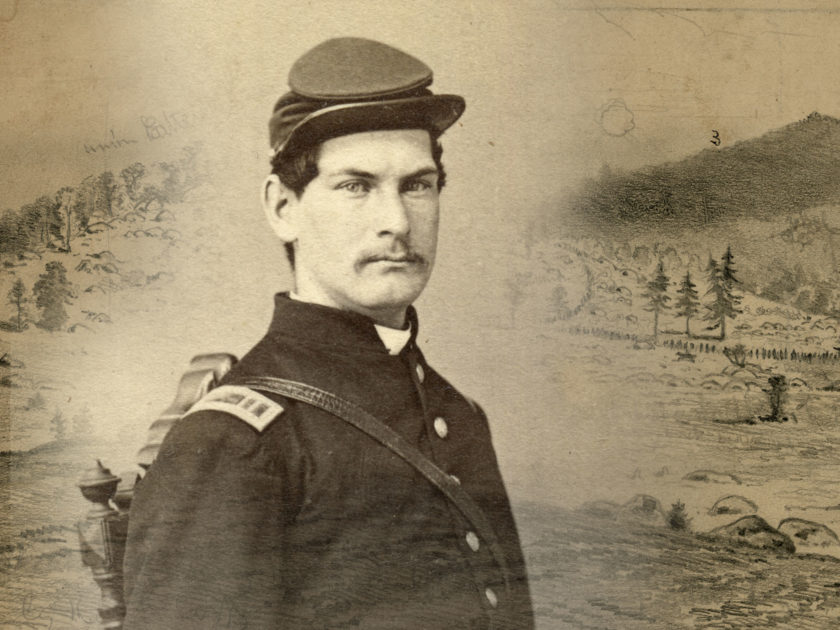Nancy and George Hoover looked on helplessly as rebels traipsed through their modest Pennsylvania farm following the Battle of Gettysburg. The Confederates, disappointed yet still defiant, camped in the fields around the Hoover homestead near Waynesboro, Pa., about 20 miles west of Gettysburg.

On Monday, July 6, 1863, a group of enemy officers entered the Hoover house and made themselves comfortable. Mrs. Hoover later told a local historian that they “were seated at Mr. Hoover’s table partaking of his hospitality, and discussing the great battle and pointing out the causes of their defeat and mistakes they made.”
At one point during the dialogue, Lt. Ransom W. Wood of the 20th Georgia Infantry reached into his coat and pulled out a Bible. He had picked the Testament from the pocket of a dead Yankee captain during the battle.
About this time on another small farm about 250 miles away in New York, John Nicoll learned that his eldest son, a Union army captain, had been killed at Gettysburg. Capt. Isaac Nicoll, 23, was a quintessential patriot. Born in New York City and raised 60 miles north in the Orange County village of Blooming Grove, N.Y., he had recruited a company of volunteers in the summer of 1862. The rank and file elected its officers, and voted Nicoll their captain and commander. The unit became Company G of a new regiment, the 124th New York Infantry.
The regiment headed off to war in September 1862. “On the eve of Captain Nicoll’s departure with his regiment,” his father recalled. “The ladies of this town presented him with a handsome sword. It was not a formal presentation, simply accompanied with a letter.”
The New Yorkers were attached to the Army of the Potomac, and eventually assigned to the Third Corps. They had their baptism under fire during the disastrous attacks at Fredericksburg in December 1862. Five months later, the 124th suffered heavy casualties in the crushing Union defeat at Chancellorsville, with Nicoll’s company hit hard: one third of his men, 22 of 60, were listed as casualties. Nicoll happened to be away on a 10-day furlough, however, and missed the battle. His first lieutenant had led the company into action.
At Chancellorsville, the regiment received the sobriquet “Orange Blossoms” from its colorful colonel, Augustus Van Horne Ellis, a former steamboat captain who had wandered off to California during the heady days of the Gold Rush. An Ellis subordinate, Capt. Charles H. Weygant, recounted the story in the regiment’s history years later. He wrote that the New Yorkers were in the thick of the battle when they encountered an officer from the staff of Third Corps commander, Maj. Gen. Daniel E. Sickles. The staffer attempted to rally the remnants of two or three broken regiments. “Seeing the 124th, this officer called on it, in the name of General Sickles, to retake the woods from which one of our batteries, having fired its last round of ammunition, had just been driven. Ellis, with no other reply than ‘Hi, Hi, my Orange Blossoms,’ gave the order.” The men promptly obeyed and took the position until overwhelmed by the enemy and forced to withdraw.

Two months later at Gettysburg, Gen. Sickles advanced the 124th and the rest of his Third Corps a half-mile ahead of their assigned position, creating a deadly gap between his forces and the main Union line. Alert Confederates promptly exploited Sickles’ blunder.
Meanwhile, Nicoll and his comrades occupied Houck’s Ridge, a rise of rock-strewn ground anchored on its southern end by a prominent outcropping of boulders known as Devil’s Den. “We had not yet learned by bitter experience the inestimable value of breastworks, and instead of spending our leisure time in rolling together the loose stones and throwing over them such a quantity of earth as would have formed a bullet proof line, we lounged about on the grass and rocks, quietly awaiting the coming shock, which many declared themselves ready and anxious to receive.” recorded Weygant. “But there were undoubtedly those among us who ardently wished and perhaps secretly prayed that when the battle opened, it might rage the most furiously along some other part of the line.”
Nicoll’s mindset at this moment is not known. But a couple weeks earlier on June 21, he had penned a foreboding request on the fly leaf of a Bible that he carried in his pocket: “In case I am killed and my body left on the field, the finder of this Testament wille please send it to my father, John Nicoll, Blooming Grove, Orange county, N. York, and confer a great favor on me.”
About 3 p.m., the roar of enemy artillery presaged an attack. Nicoll and his fellow officers steadied the men and braced for battle as long lines of gray infantry appeared on the near horizon. Texans and Arkansans among the Confederates belonged to Gen. James Longstreet’s corps.
Weygant reported, “As we held the position by a single line of battle unsupported, the enemy’s superiority in numbers, as seen at a glance, seemed overwhelming. As they approached they deployed in four distinct lines of battle, and came resolutely on under a rapid fire from our batteries. All seemed lost but in the steady lines of the Third corps not a man flinched. …When the enemy’s advance line drew near the base of the hill we were on, it appeared to almost halt for a minute, and then started rapidly forward again, and with fierce yells began ascending the slope; and there was heard an opening crash of riflery all along our front, which was the death knell of hundreds; yet on, on they came, but very slowly, only a few feet at a time.”
The New Yorkers fought the rebels to a standstill. Only 20 yards or so separated the opposing forces. At this critical moment, Maj. James Cromwell of the 124th saw an opportunity to break the Confederate line. He asked Col. Ellis to order a countercharge.
“Presently Ellis by a simple nod gives the desired permission; at which Cromwell waves his sword twice above his head, makes a lunge forward, shouts the charge, and putting spurs to his horse, dashes forward through the lines. The men cease firing for a minute and with ready bayonets rush after him. Ellis sits still in his saddle and looks on as if in proud admiration of both his loved Major and gallant sons of Orange, until the regiment is fairly under way, and then rushes with them into the thickest of the fray,” related Weygant.

Capt. Nicoll was with them, and led his company into the inferno. “The conflict at this point defies description. Roaring cannon, crashing riflery, screeching shots, bursting shells, hissing bullets, cheers, shouts, shrieks and groans were the notes of the song of death which greeted the grim reaper, as with mighty sweeps he leveled down the richest field of scarlet human grain ever garnered on this continent,” wrote Weygant.
The charge broke the Confederate line, but with fleeting success. In a flash, a second gray line advanced. A solid line of Georgians, including Lt. Wood’s regiment, “poured into us a terrible fire which seemed in an instant to bring down a full quarter of our number,” declared Weygant. In the center of this maelstrom, Cromwell suffered a fatal bullet wound to the chest. Weygant noted that Col. Ellis responded, “My God! My God, men! Your Major’s down; Save him! Save him.” Soon after, a bullet hit Ellis in the head and he toppled from his saddle. He fell among the rocks as his horse galloped pell-mell into enemy lines.
Nicoll joined his major and colonel in death. “He was pierced by three balls—one in his neck, one in his shoulder and one in his breast. He lived but three minutes after receiving these injuries,” later explained his father.
Nicoll lay wedged between two large rocks at the farthest point of the advance. Two of his comrades were wounded or killed during an attempt to remove his body. Others managed to recover the remains of Cromwell and Ellis.
By this time, the Confederates had surged forward, and compelled the New Yorkers to withdraw. But the staunch resistance by the Orange Blossoms and other federals in this sector of the battlefield slowed the rebel advance, and bought time for Union forces that hastily arrayed for battle along the ridge of nearby Little Round Top.
The Confederates that occupied the abandoned position systematically lined up the dead federals and stripped them of their shoes and other valuables. It was about this time that Lt. Wood removed the testament from Nicoll’s pocket.
Nicoll’s body was buried in the vicinity of where he fell. Two conflicting accounts survive about how his remains came to be buried.
According to one story in a New York newspaper, the Confederates had discovered the symbol of the Masons inside the Bible. Nicoll had joined the fraternity before he left New York, and the bonds of Masonry were stronger that the divisions that separated the disunited states. In light of this connection, the rebels provided the “decent rites of sepulchre.” The Confederates, according to the report, gave Nicoll a proper burial that included the placement of evergreens, the Masonic symbol of immortality of the soul, with the body, and a headboard with his name, regimental number and the Masonic symbol.
Nicoll’s father told a different version. He noted that after the Confederates abandoned Houck’s Ridge and Devil’s Den, Union forces reoccupied the ground, and that “A brother officer found his body, buried where it fell, erected a board at its head with his name, regiment and company inscribed upon it.”
A few days later at the Hoover farmhouse, Nancy Hoover recalled that Wood passed the book around the table. His comrades took turns thumbing through its pages, which contained many notes and underscored passages. She told the historian, “Upon examining it one of them remarked, ‘This Testament contains a request within it, which should be observed.’” About this time, Mrs. Hoover read the request, and suggested to the Confederates that they leave the book with her. She would send it to Nicoll’s father.

Wood complied. According to Mrs. Hoover, “Shortly after the departure of these officers, Mr. Hoover sent the Testament by mail to Mr. Nicoll, with a letter containing the circumstances under which he became possessed of it.”
John Nicoll received the package. He replied in a letter to the Hoovers on July 24, 1863. “It is a precious relic of a dearly loved and highly honored son. In looking over its pages I discover memorandums of periods up to the day previous to his death, which were devoted (notwithstanding the long marches and fatigue attending them) to its perusal. … This Testament, conveyed by his own hand, in view of the uncertainty of life, and the necessity of preparation, constitutes to me its greatest value,” and also noted, “You can therefore appreciate the value I place upon this book—the cherished companion of his weary marches and lonely hours.”
Mr. Nicoll recovered his son’s body and returned it to Blooming Grove. The remains were buried in a cemetery at nearby Washingtonville, N.Y., in October 1863.
After the war, the national organization of Union veterans known as the Grand Army of the Republic established posts across the country. The Washingtonville chapter was named the Isaac Nicoll Post in honor of the fallen captain.
The elder Nicoll died in 1874.
Seven years later, on a hot summer day in 1881, veterans from area G.A.R. posts assembled in Blooming Grove for a ceremony to dedicate a memorial to townsmen who served in the War of 1812 and the Civil War. “The monument,” noted a local newspaper, “is a simple but handsome one of granite, surmounted by a bronze eagle, resting on a cannon ball and crossed cannon.” An inscription on one face of the pedestal reads, “To the memory of Capt. Isaac Nicoll, Co. G., 124th Regt. N.Y. Volunteers, and the men from Blooming Grove who fought in the war for the Unity of the Republic, 1861-1865.”
References: Jacob Hoke, Reminiscences of the War, or, Incidents Which Transpired in and about Chambersburg, During the War of the Rebellion; Mary G. Woodhull and Francis B. Stevens, The Woodhull Family in England and America; Charles H. Weygant, History of the One Hundred and Twenty-Fourth Regiment, N.Y.S.V.; The War of the Rebellion: A Compilation of the Official Records of the Union and Confederate Armies; Isaac Nicoll military service record, National Archives and Records Service, Washington, D.C.; 124th Regiment, NY Volunteer Infantry, Civil War Newspapers Clippings, New York State Military Museum and Veterans Research Center, Saratoga Springs, N.Y.; Middletown (New York) Daily Press, June 11, 1891; Ryan McIntyre, historian of the 124th New York Infantry reenactment group.
Ronald S. Coddington is Editor and Publisher of MI.
SPREAD THE WORD: We encourage you to share this story on social media and elsewhere to educate and raise awareness. If you wish to use any image on this page for another purpose, please request permission.
LEARN MORE about Military Images, America’s only magazine dedicated to showcasing, interpreting and preserving Civil War portrait photography.
VISIT OUR STORE to subscribe, renew a subscription, and more.

